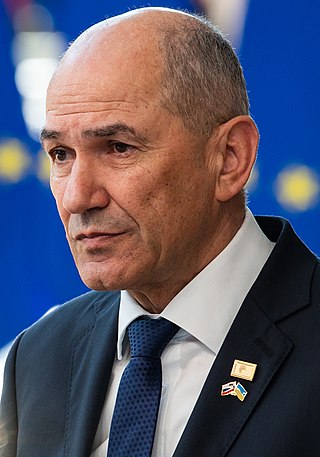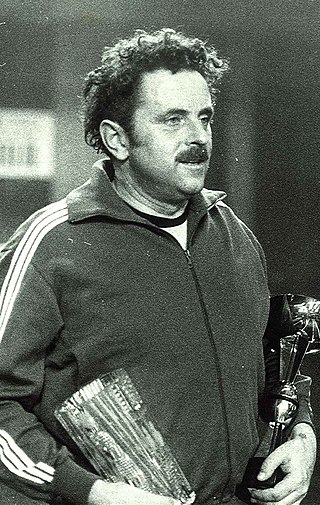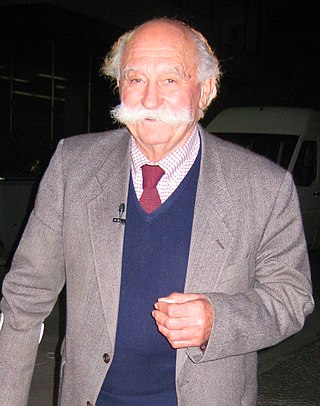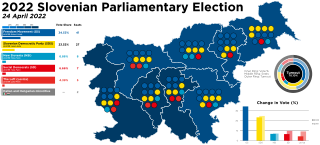Contents
| |||||
| Decades: | |||||
|---|---|---|---|---|---|
| See also: | |||||
Events in the year 2020 in Slovenia .
| |||||
| Decades: | |||||
|---|---|---|---|---|---|
| See also: | |||||
Events in the year 2020 in Slovenia .


The Slovenian Democratic Party, formerly the Social Democratic Party of Slovenia, is a conservative parliamentary party; it is also one of the largest parties in Slovenia, with approximately 30,000 reported members in 2013.

The Social Democrats is a centre-left and pro-European social-democratic political party in Slovenia led by Matjaž Han. From 1993 until 2005, the party was known as the United List of Social Democrats. It is the successor of the League of Communists of Slovenia. As of 2022, the party is a member of a three-party coalition government with Robert Golob's Freedom Movement alongside The Left, as well as a full member of the Party of European Socialists and Progressive Alliance.

Ivan Janša, baptized and best known as Janez Janša, is a Slovenian politician who served three times as a prime minister of Slovenia, a position he had held from 2004 to 2008, from 2012 to 2013, and from 2020 to 2022. Since 1993, Janša has led the Slovenian Democratic Party, which has emerged as the pre-eminent Slovenian conservative party. Janša lost his fourth bid for prime minister in April 2022, his party defeated by the Freedom Movement party.
The JBTZ trial or the JBTZ affair, also known as the Ljubljana trial or the Trial against the Four was a political trial held in a military court in Slovenia, then part of Yugoslavia in 1988. The defendants, Janez Janša, Ivan Borštner, David Tasić and Franci Zavrl, were sentenced to between six months' and four years' imprisonment for "betraying military secrets", after being involved in writing and publishing articles critical of the Yugoslav People's Army. The trial sparked great uproar in Slovenia, and was an important event for the organization and development of the liberal democratic opposition in the republic. The Committee for the Defence of Human Rights was founded on the same day of the arrest, which is generally considered as the beginning of the so-called Slovenian Spring.

Miro Steržaj was a Slovene 9 pin bowling player and politician.

Janez Stanovnik was a Slovenian economist, politician, and Partisan. He served as the last President of the Socialist Republic of Slovenia between 1988 and 1990. From 2003 to 2013, he was the president of the Slovenian Partisan Veterans' Association.

Parliamentary elections were held in Slovenia on 4 December 2011 to elect the 90 deputies of the National Assembly. This was the first early election in Slovenia's history. The election was surprisingly won by the center-left Positive Slovenia party, led by Zoran Janković. However, he failed to be elected as the new prime minister in the National Assembly, and the new government was instead formed by a right-leaning coalition of five parties, led by Janez Janša, the president of the second-placed Slovenian Democratic Party. The voter turnout was 65.60%.

Parliamentary elections were held in Slovenia on 3 June 2018. The elections were originally expected to be held later in June 2018, but after the resignation of Prime Minister Miro Cerar on 14 March 2018 all parties called for snap elections. They were the third consecutive snap elections after 2011 and 2014.
Events in the year 2012 in Slovenia.
Events in the year 2018 in Slovenia.
In the run up to the 2022 Slovenian parliamentary election, various organizations carried out opinion polling to gauge voting intention in Slovenia. Results of such polls are displayed in this article. The date range for these opinion polls are from the 2018 Slovenian parliamentary election, held on 3 June, to the present day. The next parliamentary election was held on 24 April 2022.

Parliamentary elections were held in Slovenia on 24 April 2022 to elect all 90 members of the National Assembly.
The 14th Government of Slovenia was formed following the resignation of Prime Minister of the 13th Government Marjan Šarec in January 2020. Janez Janša of Slovenian Democratic Party formed a coalition with Modern Centre Party, New Slovenia, and Democratic Party of Pensioners of Slovenia. The government was confirmed on 13 March 2020, amidst the COVID-19 pandemic.

Janez Kocijančič was a Slovene politician and lawyer. He was also the president of the Slovenian Olympic Committee from 1991 to 2014.
Events in the year 2021 in Slovenia. The year was marked by the continuation of the COVID-19 pandemic in Slovenia.
The Freedom Movement is a social-liberal political party in Slovenia. It was founded on 26 January 2022, as the successor of the extraparliamentary Green Actions Party (Z.DEJ). At the January congress, Robert Golob was elected as the party's first president and the party received its new identity and name.
Events in the year 2022 in Slovenia.

Tatjana Bobnar is a Slovenian police officer and politician. She has served the minister of interior of the Slovenia until 14 December 2022.
Shortly after the third Janša government took office in early 2020, a series of large, mostly-peaceful protests were held. The start of the protests coincided with the beginning of the COVID-19 pandemic in Slovenia, with temporary restriction of movement and public gatherings in force to curb the spread of the disease. Early protests included the display of flags and banners from balconies and windows. At the end of April, public rallies began to be organised; most protesters bicycled, since recreational movement was permitted in public places. Between April 2020 and April 2022, when a scheduled parliamentary election was held, there were 105 protest rallies organised each Friday by a coalition of non-governmental organisations and civil groups called "People's Protest Assembly". Besides the periodic Friday protests, there were occasional demonstrations called for by other groups, including protests against anti-Covid measures and pro-government rallies; notably, on 5 November 2020, protests organized by groups not associated with the regular protests led to riots. Several systemic and operative flaws were identified in the Police handling of the protests, including excessive use of force.
Events in the year 2008 in Slovenia.